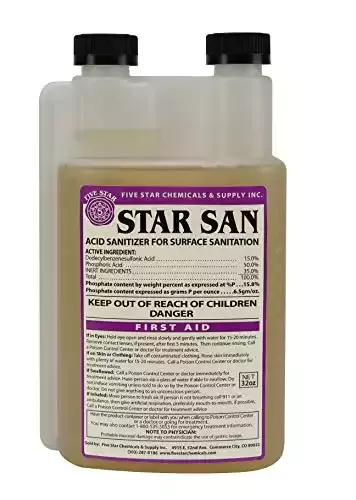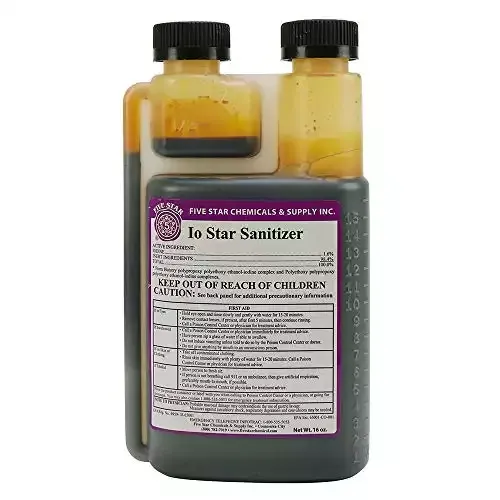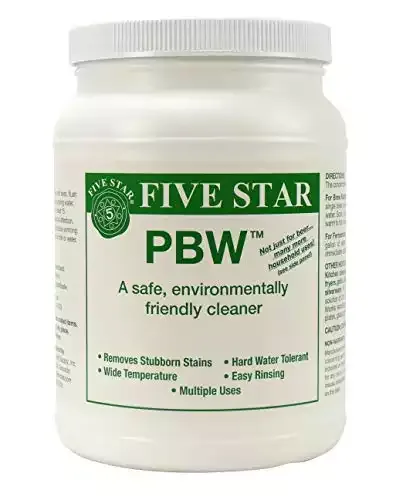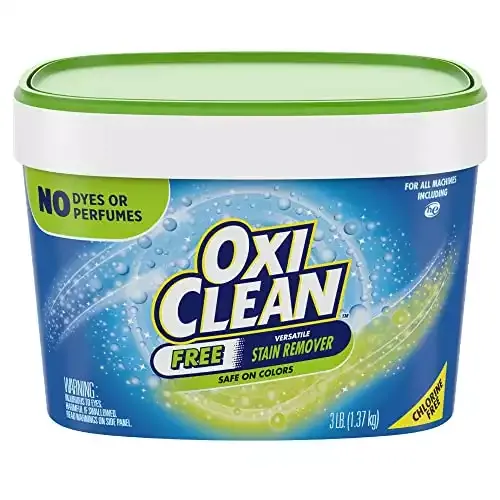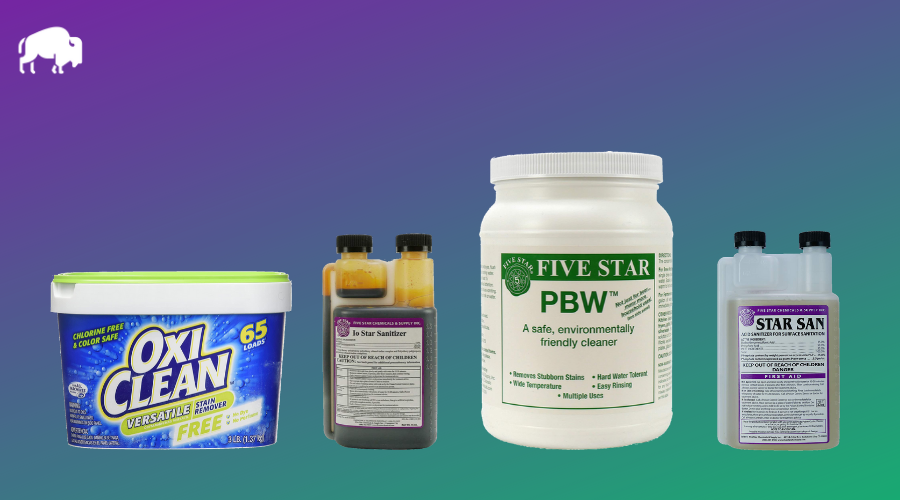
Cleanliness is the best way to avoid infections in your homebrews. Without some serious cleaning and sanitizing equipment, all the wrong organisms will grow in your wort and ruin your batches.
We recommend Star San and PBW for sanitizing and cleaning. PBW’s formulation makes cleaning almost effortless, although it does need rinsing. Star San’s foaming action and almost-instant effects outstrip the competition.
In this rundown, we take you through every popular cleaner and sanitizer out there. We’ll dive deep into the ingredients of each, how they work, why they work, and what sets each one apart. You’ll know which ones are good in which situations.
None of the options we’ve listed below are bad choices. They each have their pros and cons, and there’s nothing wrong with experimenting with new methods. Be careful with your rinsing and dilution, though. Most of these are sold in very concentrated amounts, and you should handle them with caution.
Sanitizers
The purpose of a sanitizer is to remove microorganisms from the surface it is applied to. It’s one of the most important tools in a homebrewer’s arsenal. Every tool that touches your wort after the boil needs to be thoroughly sanitized.
Part of making beer is creating an environment where microorganisms can grow. Yeast is, after all, a microorganism. This is why sanitizing is so important. If any other microorganism is alive, it will grow right alongside the yeast.
All common sanitizers are sold in heavily concentrated amounts. Make sure to dilute your sanitizer as directed on the label to ensure your safety.
Star San
STAR SAN is a high foaming, acid-based, no-rinse sanitizer that is effective and easy to use.
Star San is one of the most popular sanitization products for homebrewing, and for a good reason. It was developed specifically to sanitize homebrewing equipment. It is made from phosphoric acid and is a bit more expensive than the other options we’ve listed. Still, it’s worth the cost.
It only takes a few seconds to sanitize something using Star San. This means that you can even load it into a spray bottle and spray parts like the mash paddle and quickly use them. When soaking, it will sanitize in one or two minutes.
It’s also a foaming solution, which is ideal when you’re sanitizing a large surface. The foam is just as effective as the liquid, and it will fill every space in a keg, bucket, or carboy. It’s still a no-rinse sanitizer though and has no flavor or odor to affect your beer.
Where to buy: Amazon, MoreBeer
IO Star
Perfect for pump or spray applications where foaming is not desired and especially with glass carboys because it doesn't make them slippery.
IO Star is a non-foaming iodine-based cleaner. It’s also known as iodophor and is a popular way to sanitize your beer. It’s a little bit cheaper than Star San in most cases, and its non-foaming formula can be easier to control.
There are a few drawbacks that cause us not to recommend it, though. The number one problem is that it’s a staining cleaner. This is due to the iodine content. Other cleaners don’t use iodine, so they don’t have this problem.
The other drawback is that it’s a non-foaming sanitizer. The purpose of the foam is to fill every corner of the surface you’re cleaning. If you miss a tiny spot, the foam will cover it and sanitize it anyway. With no foam, you have to be very careful while cleaning to reach every inch.
It also takes a bit longer to sanitize than Star San. In two minutes of soaking, your equipment will be sanitized to homebrewing standards. Ten minutes is long enough to sanitize to hospital standards.
Where to buy: Amazon, MoreBeer
Bleach
If you don’t have access to other sanitizers, household bleach can work when diluted. It’s convenient, especially if you run out of other sanitizers and can’t go get more immediately. We don’t recommend it though, due to its long soaking time.
To sanitize brewing equipment with bleach, you must soak them for 20 minutes before use. This isn’t viable in a lot of instances. For example, if you need to use your mash paddle after the boil, a quick spray with Star San is much faster.
Like IO Star above, bleach is a non-foaming sanitizer. This doesn’t mean you can’t use it, but you have to be careful that every corner is fully submerged for 20 minutes. At concentrations of 1 tablespoon of bleach per gallon, you do not need to rinse the equipment before use. Many brewers recommend rinsing anyway, though, to be safe against off-flavors.
Cleaners
The goal of a cleaner is not to destroy microorganisms, like sanitizer. Instead, the goal is to remove all the stuck-on messes, pieces of grain, or anything else you can see. It will also remove some microorganisms, though.
Cleaning alone is not enough for brewing. You should clean first and sanitize second. This ensures that your equipment doesn’t have any bacteria that will infect your beer. Sanitization only sanitizes the surface, so the entire surface must be clean first.
We regularly use and recommend PBW for cleaning your equipment. It’s more expensive than the rest, but it’s the most effective. Its formulation reduces hard water buildup and is almost effortless to clean with.
All these are offered in powdered form and, like the sanitizers, are dissolved in water to clean. They can also irritate your skin. At the concentrations used in homebrewing, they aren’t dangerous.
PBW (Powdered Brewery Wash)
PBW is an alkaline, non-caustic, environmentally and user-friendly cleaner that is very effective in removing thick, difficult, and caked-on organic soils.
PBW, like the other options below, is a percarbonate cleaner. This means that it uses a molecule that breaks down to hydrogen peroxide when dissolved in water. Hydrogen Peroxide is a safe, common cleaner that breaks down into oxygen and water when it’s done.
All these cleaners function in this way. So what makes PBW different? The answer is its other ingredients. PBW does not cause hard water scaling on your equipment due to its chelating agent. It also has sodium metasilicate, making it more basic than the others.
PBW is noticeably more expensive. You’ll only be using one ounce per gallon, though, so one large container will last you a long time. The other downside of using this cleaner is that you need to rinse your equipment after cleaning.
Where to buy: Amazon, MoreBeer
Oxiclean, One-Step, and B-Brite
OxiClean Free has a unique formula that is activated by water, unleashing bubbling oxygen power for safe, effective cleaning.
These three cleaners are a fine choice to clean stuck-on messes from your equipment. They are also percarbonate cleaners that dissolve into hydrogen peroxide. One-Step and B-Brite were both made for brewing, while Oxiclean has a larger audience.
These generally work fine but aren’t quite as effective as PBW. The lack of sodium metasilicate makes them less basic, meaning the stuck-on messes won’t come off as fast. If you clean your equipment right after use as you should, there should be little to no stuck-on mess to remove.
These are all significantly cheaper than PBW. For example, One-Step is almost half the cost of PBW, and B-Brite is even less. If you’re willing to put in a little extra work in scrubbing sometimes, they’re a good alternative.
One-Step and B-Brite are both no-rinse cleaners. This means that you can soak your equipment in them, pull it out, and immediately start using it. This stands in contrast to PBW and Oxiclean, which both need to be rinsed before using.
Where to buy: Amazon, MoreBeer
Dish Soap
Like with sanitizing, there is an option that every brewer will already have: the humble dish soap. Dish soap is also designed to remove stuck-on messes, so it makes sense that it would remove these as well.
It does work just fine for cleaning. The reason we don’t recommend it is due to its negative effects on beer. You will need to rinse your equipment very thoroughly if you use dish soap. Any left in the kettle at all could cause a nasty film on your beer, or destroy your head retention.
As long as you rinse your equipment very well, you can use dish soap in the same way as any other cleaner. Considering the risk, though, we recommend sticking with percarbonate cleaners.
Final Thoughts
Cleaning and sanitization plague every brewer, even professional ones. In brewing, you are intentionally creating an environment for organisms to breed. This means other organisms (or even wild yeast) will find your wort tasty too.
We recommend the tried-and-true combination of PBW and Star San. They are more expensive, but they’re priced that way because they are truly the best. All the options we’ve listed here work well enough, but PBW and Star San go above and beyond.
The fight to grow only the right types of microorganisms in our beer continues every day. Stay strong, soldier. Pick one of these weapons and wage battle.
Frequently Asked Questions
What’s the difference between cleaning and sanitizing?
Cleanliness is on the macro level — that is, it focuses on things you can see. Cleaning removes dirt, debris, and anything stuck to a piece of equipment. This will remove a lot of microorganisms as well, but not all of them.
Sanitizing is where you destroy the microorganisms. These are the bacteria cells that would otherwise grow in your wort. By killing as many as possible, your yeast has the best chance to outcompete them and fight off infection.

